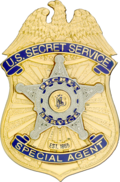United States Secret Service
| United States Secret Service | |
|---|---|
 Emblem of the U.S Secret Service | |
 Secret Service special agent badge | |
 U.S. Secret Service flag | |
| Common name | Secret Service |
| Abbreviation | USSS |
| Agency overview | |
| Formed | July 5, 1865 |
| Employees | 8,300+ (2024)[1] |
| Annual budget | US$3.2 billion (2025)[1] |
| Jurisdictional structure | |
| Operations jurisdiction | United States |
| Operational structure | |
| Headquarters | Washington, D.C., U.S. |
| Agency executive | |
| Parent agency | U.S. Department of Homeland Security (2003–present) U.S. Department of the Treasury (1865–2003) |
| Facilities | |
| Field and resident offices | 116 |
| Overseas offices | 20 |
| Website | |
| secretservice.gov | |
The United States Secret Service (simply known as Secret Service)[3] is a federal law enforcement agency under the U.S. Department of Homeland Security. The agency is in charge with handling criminal investigations and protecting political leaders of the United States, their families, and visiting heads of state or government.[4] The agency was under the United States Department of the Treasury until 2003.[5]
History
[change | change source]President Abraham Lincoln signed the legislation that established the Secret Service just hours before he was assassinated on April 14, 1865.
After the Assassination of President William McKinley in September 1901, U.S. Congress passed a federal law and directed the Secret Service to provide mandatory protection to the president.
Primary missions
[change | change source]The Secret Service is authorized by 18 U.S.C. § 3056(a) to protect:[6][7]
- President of the United States
- Vice President of the United States
- First Lady of the United States
- Spouse of the Vice President
- President-elect
- Vice President-elect
- People in the presidential line of succession.
- The immediate family members such as children, grandchildren, stepchildren, in-laws etc.
- Former presidents and their spouses for the rest of their life, unless the spouse remarries.
- Children of former presidents under the age of 16.
- Visiting heads of state or government and their spouses.
- Major presidential and vice presidential candidates and their spouses
- Former vice presidents, their spouses up to six months after the former vice president leaves office.
The Secret Service also provides security for the White House, the Number One Observatory Circle, Treasury Department building and private residences of the president and former presidents.
Other missions
[change | change source]The Secret Service is tasked with protecting the financial systems of the United States and cyber-based crime such as, counterfeit money, bank and financial fraud, mail fraud, and wire fraud.[8]
References
[change | change source]- ↑ 1.0 1.1 "Department of Homeland Security | U.S. Secret Service | Budget Overview | Fiscal Year 2025 Congressional Justification" (PDF). dhs.gov. Retrieved June 7, 2024.
- ↑ "Our Leadership". U.S. Secret Service. Retrieved 23 July 2024.
- ↑ "Home | United States Secret Service". www.secretservice.gov. Retrieved 2023-11-22.
- ↑ "About Us". www.secretservice.gov. Retrieved 2023-11-22.
- ↑ "Mission Support". www.secretservice.gov. Retrieved 2023-11-22.
- ↑ "18 U.S. Code § 3056 - Powers, authorities, and duties of United States Secret Service". LII / Legal Information Institute. Retrieved 2023-11-22.
- ↑ "Protection". www.secretservice.gov. Retrieved 2023-11-22.
- ↑ "Financial and Cyber Crime Investigations". www.secretservice.gov. Retrieved 2023-11-22.
